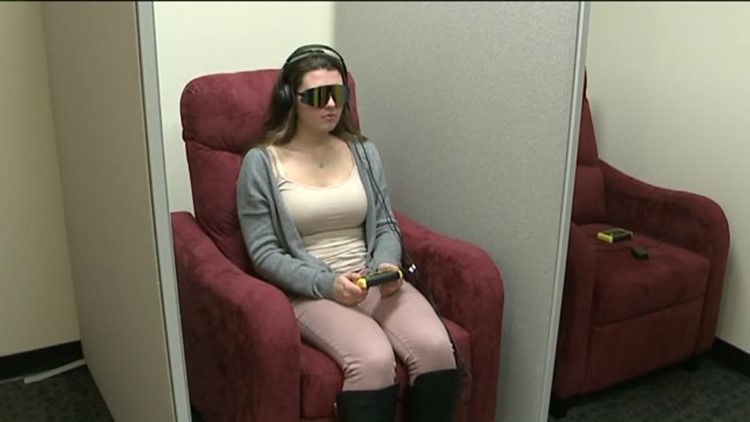WILKES-BARRE -- Imagine if you could train your brain to be more relaxed, more focused, or more energized.
Research says you can. It's called neurotraining, and some students at Wilkes University in Luzerne County are getting a firsthand look at how it works.
Sidney, a Wilkes University student, settled in at the neurotraining and research center on campus. She's instructed to put on special glasses and earphones and relax.
She is seeing and hearing audiovisual entrainment, or AVE.
"We have techniques for reducing stress, for making someone calmer, we have techniques for focus or concentration," explained Dr. Ed Schicatano, a professor of psychology at Wilkes.
He explained the concept of neurotraining, the idea that you can use techniques to enhance mental performance by targeting certain brain waves.
AVE, for instance, offers programs to energize you, or to help you sleep.
"We also have techniques to train an individual, let's say an athlete, to help them get into peak performance state, sort of to be in the zone, which could be calm and focused at the same time."
The Neurotraining & Research Center has been open for a few weeks at Wilkes. It's free, student-run, and open only to Wilkes students, faculty and staff.
Officials say it's not a new concept, but it's unusual to see in a college setting.
Another offering at the center is something called biofeedback.
"These are the brain waves we're trying to encourage Julie to make. They're associated with focus and attention."
Dr. Bob Bohlander is a professor of psychology at Wilkes and co-director of the center.
"There are very slow brain waves, more associated with sleep and meditation, and there are fast ones associated with information processing, then there are brain waves in the middle, the ones with the ability to shift or focus your attention. These are the brain waves we tend to target," he explained. "So if your brain gets rewarded for producing certain brainwaves, it produces more of those brainwaves."
Dr. Bohlander says this is conditioning happening deep inside the brain. The idea is that with practice, your brain can take what it learns here into the classroom or workplace.



